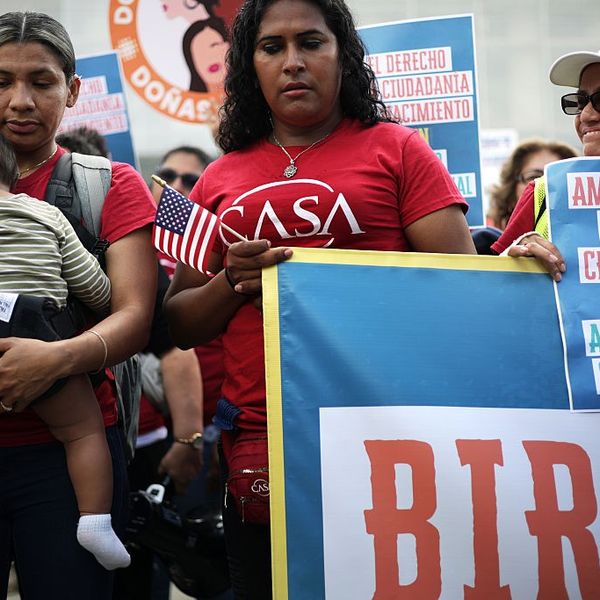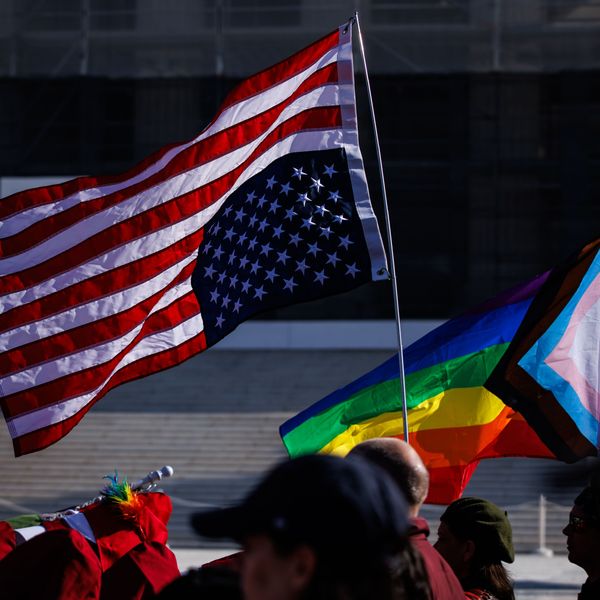SCOTUS Ruling to Fuel Movement to Amend Constitution
Congress can't ignore 'that momentum in the states'
Monday's Supreme Court 5-4 ruling, which struck down Montana's challenge to Citizens United, was a set back in the fight against unlimited corporate campaign spending, but watchdog groups contend that the ruling has only revitalized a national movement to amend the Constitution to restrict corporate money in Washington.
Monday's ruling "underscores the need for a constitutional amendment since there's no prospect of this court undoing the damage it's done," said Robert Weissman, president of Public Citizen, among several groups leading the 'move to amend' charge. "And if we take seriously how consequential is that damage, then we need an amendment to remedy it."
Across the country states and local communities have approved resolutions in support of such a constitutional amendment to reverse the damage done by Citizens United. Hawaii, New Mexico, Vermont and Rhode Island have already passed such resolutions and Massachusetts and California are scheduled to vote on similar resolutions as early as Thursday, reports Eliza Newlin Carney for Roll Call.
Carney reports that more than 200 such measures have been enacted at the local level as the movement continues to grow louder.
"It's going to be very difficult for Congress to ignore that momentum in the states," said John Bonifaz, executive director of Free Speech for People.
* * *
Eliza Newlin Carney/Roll Call: Montana Ruling Could Fuel Campaign to Amend Constitution
The Supreme Court's Monday ruling to strike Montana's ban on corporate campaign spending opens a new chapter in the political money wars, fueling an improbable but increasingly vocal movement to amend the Constitution.
"This Supreme Court ruling could be a watershed in terms of the court aligning itself with the interests of big corporations," said Jamie Raskin, a Maryland state Senator and law professor at American University's Washington College of Law. "And the constitutional amendment strategy will be a way to plant the flag and rally people for a different vision of the Constitution and the country."
More than a dozen Members of Congress have proposed various constitutional amendments in the wake of the Supreme Court's Citizens United v. Federal Election Commission ruling to deregulate corporate and union political spending. Some declare that corporations are not people; others empower Congress and the states to restrict campaign spending and contributions.
Until now, such proposals have garnered little notice, given the slim likelihood that any could clear the high bar set for amending the Constitution: a two-thirds majority in Congress and ratification by at least 38 states. [...]
"America has to wake up to the fact that there is a conservative legal and judicial movement afoot to wipe out all campaign finance laws, and James Bopp is very clear about that," said Raskin, who authored a letter asking Congress to consider a constitutional amendment that has been signed by a majority of Maryland's state legislators.
To Raskin, that makes the case for a constitutional amendment all the more urgent. Some on Capitol Hill agree. Following Monday's ruling, several Democrats who have either authored or co-sponsored constitutional amendments issued statements saying they would now redouble their efforts. That includes Rep. Adam Schiff (D-Calif.), the most recent federal lawmaker to propose an amendment to permit limits on political money.
# # #
An Urgent Message From Our Co-Founder
Dear Common Dreams reader, The U.S. is on a fast track to authoritarianism like nothing I've ever seen. Meanwhile, corporate news outlets are utterly capitulating to Trump, twisting their coverage to avoid drawing his ire while lining up to stuff cash in his pockets. That's why I believe that Common Dreams is doing the best and most consequential reporting that we've ever done. Our small but mighty team is a progressive reporting powerhouse, covering the news every day that the corporate media never will. Our mission has always been simple: To inform. To inspire. And to ignite change for the common good. Now here's the key piece that I want all our readers to understand: None of this would be possible without your financial support. That's not just some fundraising cliche. It's the absolute and literal truth. We don't accept corporate advertising and never will. We don't have a paywall because we don't think people should be blocked from critical news based on their ability to pay. Everything we do is funded by the donations of readers like you. Will you donate now to help power the nonprofit, independent reporting of Common Dreams? Thank you for being a vital member of our community. Together, we can keep independent journalism alive when it’s needed most. - Craig Brown, Co-founder |
Monday's Supreme Court 5-4 ruling, which struck down Montana's challenge to Citizens United, was a set back in the fight against unlimited corporate campaign spending, but watchdog groups contend that the ruling has only revitalized a national movement to amend the Constitution to restrict corporate money in Washington.
Monday's ruling "underscores the need for a constitutional amendment since there's no prospect of this court undoing the damage it's done," said Robert Weissman, president of Public Citizen, among several groups leading the 'move to amend' charge. "And if we take seriously how consequential is that damage, then we need an amendment to remedy it."
Across the country states and local communities have approved resolutions in support of such a constitutional amendment to reverse the damage done by Citizens United. Hawaii, New Mexico, Vermont and Rhode Island have already passed such resolutions and Massachusetts and California are scheduled to vote on similar resolutions as early as Thursday, reports Eliza Newlin Carney for Roll Call.
Carney reports that more than 200 such measures have been enacted at the local level as the movement continues to grow louder.
"It's going to be very difficult for Congress to ignore that momentum in the states," said John Bonifaz, executive director of Free Speech for People.
* * *
Eliza Newlin Carney/Roll Call: Montana Ruling Could Fuel Campaign to Amend Constitution
The Supreme Court's Monday ruling to strike Montana's ban on corporate campaign spending opens a new chapter in the political money wars, fueling an improbable but increasingly vocal movement to amend the Constitution.
"This Supreme Court ruling could be a watershed in terms of the court aligning itself with the interests of big corporations," said Jamie Raskin, a Maryland state Senator and law professor at American University's Washington College of Law. "And the constitutional amendment strategy will be a way to plant the flag and rally people for a different vision of the Constitution and the country."
More than a dozen Members of Congress have proposed various constitutional amendments in the wake of the Supreme Court's Citizens United v. Federal Election Commission ruling to deregulate corporate and union political spending. Some declare that corporations are not people; others empower Congress and the states to restrict campaign spending and contributions.
Until now, such proposals have garnered little notice, given the slim likelihood that any could clear the high bar set for amending the Constitution: a two-thirds majority in Congress and ratification by at least 38 states. [...]
"America has to wake up to the fact that there is a conservative legal and judicial movement afoot to wipe out all campaign finance laws, and James Bopp is very clear about that," said Raskin, who authored a letter asking Congress to consider a constitutional amendment that has been signed by a majority of Maryland's state legislators.
To Raskin, that makes the case for a constitutional amendment all the more urgent. Some on Capitol Hill agree. Following Monday's ruling, several Democrats who have either authored or co-sponsored constitutional amendments issued statements saying they would now redouble their efforts. That includes Rep. Adam Schiff (D-Calif.), the most recent federal lawmaker to propose an amendment to permit limits on political money.
# # #
Monday's Supreme Court 5-4 ruling, which struck down Montana's challenge to Citizens United, was a set back in the fight against unlimited corporate campaign spending, but watchdog groups contend that the ruling has only revitalized a national movement to amend the Constitution to restrict corporate money in Washington.
Monday's ruling "underscores the need for a constitutional amendment since there's no prospect of this court undoing the damage it's done," said Robert Weissman, president of Public Citizen, among several groups leading the 'move to amend' charge. "And if we take seriously how consequential is that damage, then we need an amendment to remedy it."
Across the country states and local communities have approved resolutions in support of such a constitutional amendment to reverse the damage done by Citizens United. Hawaii, New Mexico, Vermont and Rhode Island have already passed such resolutions and Massachusetts and California are scheduled to vote on similar resolutions as early as Thursday, reports Eliza Newlin Carney for Roll Call.
Carney reports that more than 200 such measures have been enacted at the local level as the movement continues to grow louder.
"It's going to be very difficult for Congress to ignore that momentum in the states," said John Bonifaz, executive director of Free Speech for People.
* * *
Eliza Newlin Carney/Roll Call: Montana Ruling Could Fuel Campaign to Amend Constitution
The Supreme Court's Monday ruling to strike Montana's ban on corporate campaign spending opens a new chapter in the political money wars, fueling an improbable but increasingly vocal movement to amend the Constitution.
"This Supreme Court ruling could be a watershed in terms of the court aligning itself with the interests of big corporations," said Jamie Raskin, a Maryland state Senator and law professor at American University's Washington College of Law. "And the constitutional amendment strategy will be a way to plant the flag and rally people for a different vision of the Constitution and the country."
More than a dozen Members of Congress have proposed various constitutional amendments in the wake of the Supreme Court's Citizens United v. Federal Election Commission ruling to deregulate corporate and union political spending. Some declare that corporations are not people; others empower Congress and the states to restrict campaign spending and contributions.
Until now, such proposals have garnered little notice, given the slim likelihood that any could clear the high bar set for amending the Constitution: a two-thirds majority in Congress and ratification by at least 38 states. [...]
"America has to wake up to the fact that there is a conservative legal and judicial movement afoot to wipe out all campaign finance laws, and James Bopp is very clear about that," said Raskin, who authored a letter asking Congress to consider a constitutional amendment that has been signed by a majority of Maryland's state legislators.
To Raskin, that makes the case for a constitutional amendment all the more urgent. Some on Capitol Hill agree. Following Monday's ruling, several Democrats who have either authored or co-sponsored constitutional amendments issued statements saying they would now redouble their efforts. That includes Rep. Adam Schiff (D-Calif.), the most recent federal lawmaker to propose an amendment to permit limits on political money.
# # #

